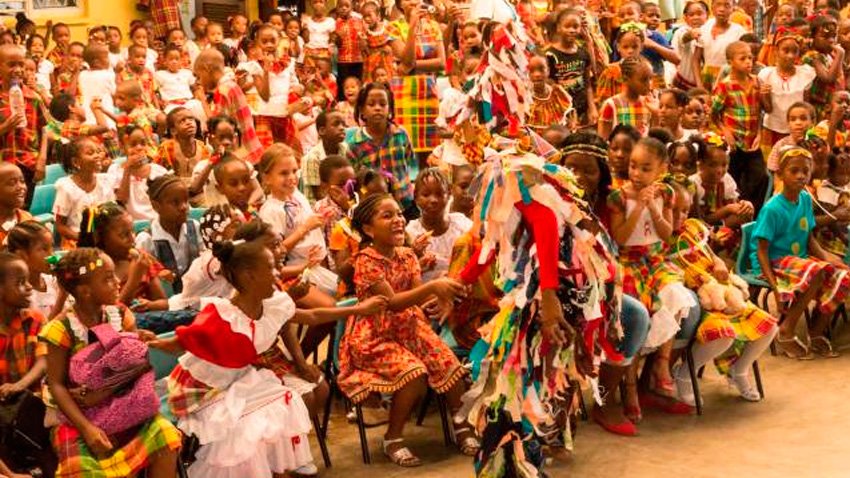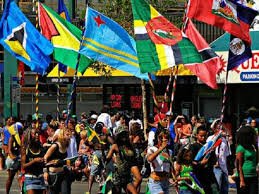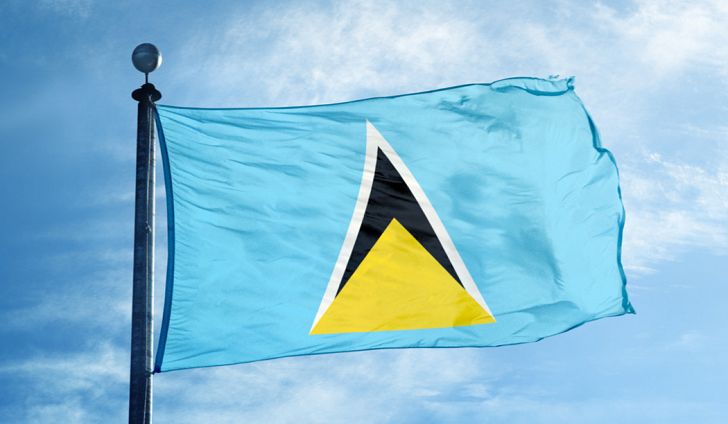Kwéyòl pa selman an langaj I sé lavi pèp Sent Lisi. Kwéyòl is not only a language it& #39;s the life of the St. Lucian people. To commemorate mwa éwitaj kwéyòl- òktob (Creole heritage month- October) it& #39;s important to share knowledge on the richness of our creole society.
1. Ki mannyè Kwéyòl sé an langaj? How is Kwéyòl a language?
A Creole is a language that develops through contact between two or more languages. Kwéyòl, as spoken in St. Lucia, is unique
A Creole is a language that develops through contact between two or more languages. Kwéyòl, as spoken in St. Lucia, is unique
despite the fact that it is easily understood by Creole speakers in Martinique, Guadeloupe, French Guyana, Grenada and Dominica where there are varying degrees of difference.
It plays a central role in local culture, religion, politics and economics and serves as an appropriate link for Creole speakers in the Americas and the Indian Ocean. (Jn Pierre, 2003:28)
#KwéyòlséSentLisi
#PatisipéanMouvman
#KwéyòlséSentLisi
#PatisipéanMouvman
2. Ki mannyè Kwéyòl dévlopé an Sent Lisi? How did Kwéyòl develop in Saint Lucia?
There are several theories about the origins and development of kwéyòl but it is widely accepted that kwéyòl "evolved out of the need for Europeans, Africans and Amerindians
There are several theories about the origins and development of kwéyòl but it is widely accepted that kwéyòl "evolved out of the need for Europeans, Africans and Amerindians
to communicate in a language that was mutually accepted by and common to most" (Jn Pierre, 1993:8). It& #39;s dominated by a French-based lexicon although its grammar and & #39;the way it gives meaning to words and phrases& #39; (FRC, 1992) is significantly influenced by West African languages.
Ès I sé jan Sent Lisi selman ki ka palé Kwéyòl? Are St. Lucians the only ones who speak creole?
There are numerous creoles spoken throughout the Caribbean.
There are numerous creoles spoken throughout the Caribbean.
Among them are :
Jamaican Creole
Guyanese Creole
Sranan (Surinamese)
Palenquero (spoken in Colombia)
Trinidadian (Patois & Hindusanti )
Grenada: Grenadian Creole (Dying language) Carriacou
Dominican Creole
Haitian Creole
#KwéyòlséSentLisi
#PatisipéanMouvman
Jamaican Creole
Guyanese Creole
Sranan (Surinamese)
Palenquero (spoken in Colombia)
Trinidadian (Patois & Hindusanti )
Grenada: Grenadian Creole (Dying language) Carriacou
Dominican Creole
Haitian Creole
#KwéyòlséSentLisi
#PatisipéanMouvman
Ayiti sé sèl péyi an kawayib-la ki ka sèvi kwéyòl kon an langaj ofisyèl.
Haiti is the only country in the Caribbean which uses creole as an official language.
#PatisipéanMouvman
#Kwéyòl
Haiti is the only country in the Caribbean which uses creole as an official language.
#PatisipéanMouvman
#Kwéyòl
Poutji moun ni katjil èk atitid ki mal lè I vini pou kwéyòl ? Why do people have thoughts and attitudes that are negative towards creole?
Many of the attitudes and ideas we have towards the creole languages come from our colonial history. European colonisers devalued the languages created by the indigenous and formerly enslaved labelling them as ‘broken’ or ‘improper’.
For example, the British historian Henry Breen wrote
“The Negro language is a jargon formed from the French, and composed of words, or rather sounds, adapted to the organs of speech in the black population.
“The Negro language is a jargon formed from the French, and composed of words, or rather sounds, adapted to the organs of speech in the black population.
As a patois it is even more unintelligible than that spoken by the Negroes in the English Colonies. Its distinguishing feature consists in the suppression of the letter “r” in almost every word in which it should be used, and the addition of the “ki’s” and “ka’s” ...
It is, in short, the French language, stripped of its manly dignified ornaments, and travestied for the accommodation of children and toothless old women.
…although possessing and extensive knowledge of the French language, acquired during a sojourn of five years in France, I have failed in obtaining anything like an adequate notion of this gibberish, during a residence of nearly fifteen years in St. Lucia and Martinique”.
6.Pèp péyi-a ni an wèskonsabilité pou lévé enpotans langaj kwéyòl an sosyété-a. The citizens of the country have a responsibility to raise the importance of the creole language in society.
Ès ou té sav? Did you know?
The Creole New Testament was launched in St. Lucia on October 10th 1999.
The Government of St. Lucia, through the Cabinet of Ministers, adopted a Kwéyòl version of St. Lucia’s National Anthem.
The Creole New Testament was launched in St. Lucia on October 10th 1999.
The Government of St. Lucia, through the Cabinet of Ministers, adopted a Kwéyòl version of St. Lucia’s National Anthem.
This decision came on the eve of Saint Lucia’s 37th Anniversary of Independence on February 22, 2016.
#KwéyòlséSentLisi
#PatisipéanMouvman
#KwéyòlséSentLisi
#PatisipéanMouvman

 Read on Twitter
Read on Twitter







